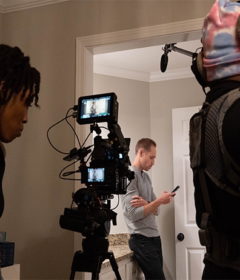Health Care Activist Byllye Avery: ‘Do Something’
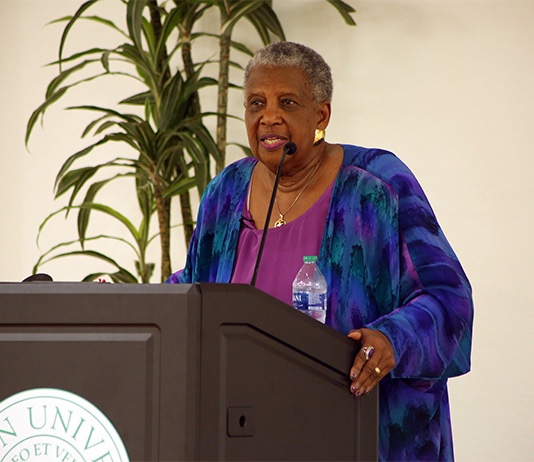
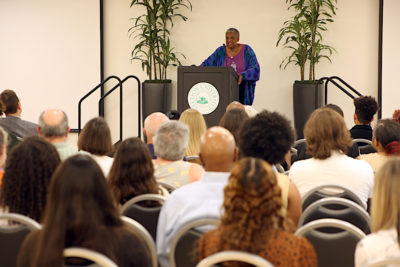
Back when Byllye Avery, living in DeLand not far from Stetson, was seeking to attend college in the mid-1950s, the option of her hometown university was nonexistent.
Avery remembers asking if she could “get an application to go to Stetson.” The university’s response was that it wasn’t “accepting negroes at this time.”
Such was the time and place, as Avery began her “journey.”
Yet, on this early evening, Tuesday, April 4, 2023, in the Stetson Room at the Carlton Union Building on campus, Avery stood tall and was enthusiastically celebrated. This night was, in fact, only the second time Avery had ever stepped foot on the Stetson campus — the first time was one night earlier.
And she had a message to share to the crowd of students, faculty and staff, along with her family and friends: “Take action. Do something” both for yourself and others.
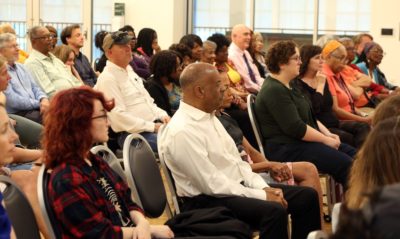
In poignant and impassioned fashion, Avery, a health care activist who now has reach near-legendary acclaim for her work, addressed the full room as part of Stetson’s James A. Stewart Lecture series during National Public Health Week. Historically, the lecture series brings voices of ethical values to campus. Avery joined the ranks of such previous series speakers as President Jimmy Carter, Bishop Desmond Tutu and anthropologist Jane Goodall.
She measured up to them well. Her words of encouragement and empowerment were that impactful.
‘Pushing Beyond Myself’
In 1959, Avery graduated from Talladega College with a bachelor’s degree in psychology and, later, received a master’s degree from the University of Florida.
Health care activism? Initially, it was never part of her plan. She was a teacher, just like her mother, and figured to remain that way — at least until she was moved to do otherwise.
At 33, she became a widowed mother of three children when her husband died of a massive heart attack. Self-described at that time as a “scared little girl from DeLand, Florida,” she began “pushing beyond myself.” (Her children were present in the room.)
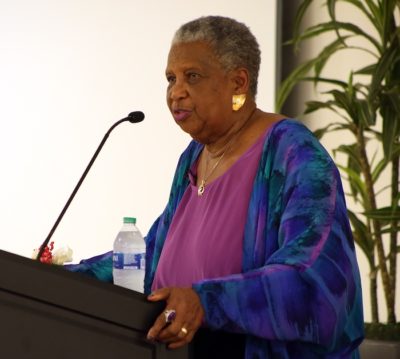
Further, Avery followed what now is her unwavering plea to others: “When you see something happening that you can do something about, do it. Just do it. … Don’t wait for somebody else to do it.”
Avery saw women, particularly Black women, suffer from health care injustice, especially regarding reproductive health issues. And she took action.
‘You Are the Action’
In 1974, she and others opened the Gainesville Women’s Health Center, which eventually broadened beyond health care to also explore women’s maternal challenges, racial disparities, personal abuse, inner healing, self-reflection and putting oneself first.
The topics proved to be revealing and resonate.
In 1983, without much formal background but with ample ambition and courage, Avery founded what is now known as the Black Women’s Health Imperative. It was the first national organization to specialize in Black women’s reproductive health issues.
Since that time, Avery has worked to develop health care services and education that address Black women’s mental and physical health stressors. All totaled, those efforts have become her mission for the past 50 years.
Not coincidentally, Avery has received multiple awards for her inspiration and impact, including the MacArthur Foundation Fellowship for Social Contribution and the Gustav O. Lienhard Award for the Advancement of Health Care from the Institute of Medicine of the National Academy of Sciences.
“We all have personal power, even a little baby. … Claim your personal power. When you have that deep respect for yourself, you have it for other people.”
Byllye Avery
Yet, as Avery asserted in her speech, much work remains. She spoke of Martin Luther King Jr. and the time he visited her class at Talladega College in Alabama and urged “forgiveness.” At the time, King wasn’t especially well known. And Avery spoke about his return, at her commencement, when he talked about not “having the luxury of sitting on the sidelines and watching what happens” and that “you are the action.”
While there has been progress, more on both fronts must still be made, Avery insisted to the captivated crowd.
‘Historically Important’
Indeed, Avery’s speech comes at a time of elevated maternal mortality rates from preventable conditions among Black women, according to Asal Mohamadi Johnson, PhD, Stetson associate professor of public health. Johnson was a driving force behind Avery’s presence on campus.
Also, Johnson described Avery as “historically important” in light of her upbringing in an era of segregation and inequality. And Johnson hoped the visit becomes an “important signifier of Stetson’s commitment to racial justice,” adding, “I believe she is a trailblazer with a message of hope for women, reminding us of our power.”
Near the end of her talk, Avery offered personal advice, too — sentiment 83 years in the making from a woman who, fair to say, has almost seen it all in women’s health care and in life.
“We all have personal power, even a little baby,” she said. “ … Claim your personal power. When you have that deep respect for yourself, you have it for other people.”
“Be careful about what you say to people,” she continued, “because you never know the impact of those words.”
“Be generous; give people compliments. That generosity comes back to you.”
“Learn how to listen. Listen more than you talk and listen to what’s not said.”
“Learn how to love yourself. It sounds easy, but it’s not.”
Finally, at the end, there were tears. Ever-poised on stage, Avery got emotional in her closing.
“I’ve been doing this for 50 years,” she said, “and I think I’m about as passionate about it now as I ever was.”
All evening long, her messages resounded loud and clear — making that comment amply understood even if they weren’t spoken.
-Michael Candelaria
Honoring Ngina Ruth Lythcott, Dr.P.H.
Additionally, as part of Byllye Avery’s return to DeLand, Stetson honored Ngina Ruth Lythcott, Dr.P.H. — Avery’s wife, as well as a health practitioner and fellow health care advocate.
Lythcott was recognized by Stetson for her work to eradicate breast cancer.
Like Avery, Lythcott possesses an extensive background in public health. A 38-year breast cancer survivor, she has been active in several organizations, such as the boards of Breast Cancer Action and the Intercultural Cancer Coalition. Also, she has done extensive community-based health promotion/disease prevention work with low-income members of diverse, urban and rural communities across the United States. And she has worked in Ghana, Tanzania, Brazil, Nigeria and South Africa.
Further, she was the director of the Health Promotion/Disease Prevention Resource Center at Morehouse School of Medicine, as well as a faculty member. And she was Dean of the College at Dartmouth College and the Dean of the College at Swarthmore College, and was Dean of Students in the schools of Public Health at Columbia and Boston universities.
Both Avery and Lythcott currently serve as advisory board members of Our Bodies Ourselves, a feminist health and reproductive justice organization. In 2022, GLBTQ Legal Advocates & Defenders (GLAD) honored Avery and Lythcott for their work in reproductive justice, civil rights and health equity.



